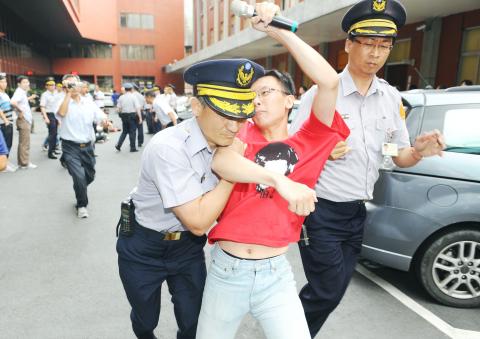|
Student protesters storm legislature
in Taipei
By Shelley Shan / Staff reporter

Two security guards yesterday
remove a protester who broke into the legislature in Taipei during a legislative
review of a draft media anti-monopolization act.
Photo: Chang Chia-ming, Taipei Times
Students from the Youth Alliance against
Media Monsters yesterday held a lie-down, locked-arm protest at the legislature
in Taipei, demanding that lawmakers on the Transportation Committee quickly pass
a draft media anti-monopolization act.
Without obtaining permission to enter the legislature, about a dozen or so
alliance members ran through a side entrance at about lunchtime and began a
protest over the slow progress being made by legislators.
Portesters also gathered in front of the building, demanding that the draft act
be passed by the committee or they would not allow the lawmakers to go home.
They also demanded that the bill be carefully reviewed and that lawmakers
consider the alliance¡¦s appeals made earlier this month.
They later lay down and locked arms in protest for about 10 minutes.
Police officers attempted to disperse the protesters by lifting them up and
moving them away from the building, while others tried to persuade female
students to sit up, take a drink of water and think about their parents at home.
The unexpected protest upset some lawmakers.
¡§We spent the entire day in the committee going over each article and they said
we cannot go home unless we pass the act today,¡¨ Chinese Nationalist Party (KMT)
Legislator Yang Li-huan (·¨ÄRÀô) said. ¡§Are they punishing us for being here? What
about those lawmakers who took a leave of absence from the committee today?¡¨
Aside from the draft act proposed by the National Communications Commission (NCC),
which contains 50 articles, lawmakers also need to review two other similar
versions proposed by the KMT and the Democratic Progressive Party (DPP).
However, they only managed to pass four articles yesterday morning and put aside
33 articles for further discussion. When the afternoon session began at 1:30pm,
lawmakers spent two hours deliberating over Article 2, which defines the
different terms used in the NCC¡¦s draft act.
A majority of the time was spent on a debate about whether the government should
use ¡§market share¡¨ or ¡§viewership rate¡¨ as the standards to gauge media
influence, which is also the main difference between the NCC version and those
put forward by the KMT and the DPP.
NCC Chairperson Howard Shyr (¥Û¥@»¨) said that market share is a very specific
term, which has been defined by the Fair Trade Commission. He defended the use
of the viewership rate as it better reflects how the audiences are influenced by
different media outlets.
Shyr¡¦s presentation failed to convince lawmakers, as they decided to adopt the
definition of ¡§market share¡¨ proposed by DPP Legislator Yeh Yi-jin (¸©y¬z) and KMT
Legislator Lo Shu-lei (ù²QÁ¢).
The two legislators defined market share as the percentage of a media outlet¡¦s
audience rating compared with the total audience rating in that particular
market.
The influence of a national daily newspaper would be gauged by its circulation,
whereas that of the cable TV station or a multimedia-on-demand station would be
gauged by the number of subscribers.
NCC officials warned that the combined use of audience share and market share
would make the calculation of media influence much more complicated than the one
it had proposed, adding that such a method has never before been used in any
country.
Meanwhile, lawmakers insisted that the act include an article banning financial
institutions from purchasing media outlets, but they could not decide whether
the NCC or the Financial Supervisory Commission (FSC) should be the agency that
punishes financial institutions violating the regulation.
Shyr said that the FSC should be the supervisory agency because the violation
should be prevented at source. If the violation is punished by the NCC, Shyr
said, the NCC would only be able to fine the media outlet involved, not the
financial institution.
¡§If a financial institution wants to do harm to a media outlet, all it has to do
is to buy a share in that outlet and cause it to lose its license. That is what
they could do if they want to engage in a malicious act,¡¨ he said.
However, the FSC said it would demand that the financial institution violating
the regulation dispose of its shares, which would be executed by an
administrative court ruling. In that case, the NCC could be the agency which
fines financial institutions violating the rule.
The committee is scheduled to continue its deliberations today.
|
![]()
![]()
![]()